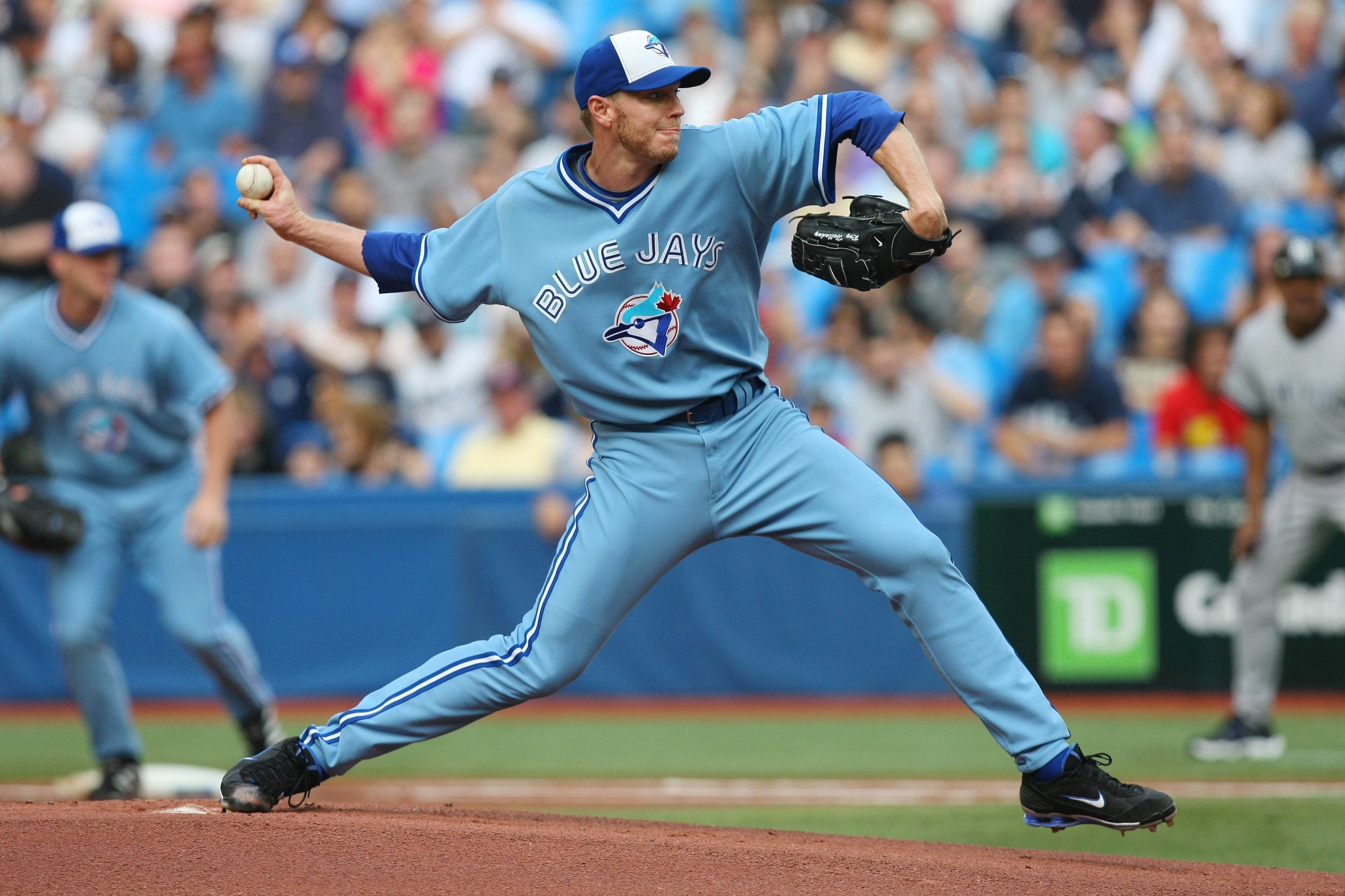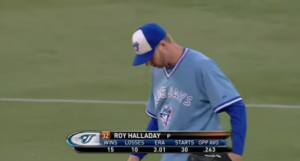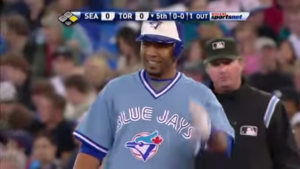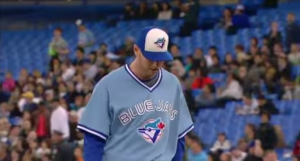On September 25th, 2009, the Blue Jays took the field to face the Seattle Mariners. It wasn’t their last home game of the season, or their last game of the season overall. Neither was it a game that had much in the way playoff implications. The Blue Jays, at the start of play, were a not-so-nice 69-84; the Mariners, though well above .500 at 80-73, were three and a half games out of the wild card with two teams ahead of them and only a week left to go. It was, for all intents and purposes, just another meaningless game in late September.
The previous night’s game, a 5-4 loss to that season’s Cy Young runner-up Felix Hernandez, had drawn a sparse crowd of 15,306. On this Friday night, though, 20,668 were in attendance as the Jays took the field to start the bottom of the 1st. Maybe it was because it was because of Flashback Friday, a chance to see the Jays playing in their classic powder blues instead of the usual abominations; maybe it was the beautiful night, the roof opened to a cool sky dappled with high clouds. But I would hazard a guess that the main draw was something else.
Leading off for the Mariners was their franchise player, Ichiro Suzuki, an incredibly skilled hitter having one of his best years at the plate – he finished that season with a .352/.386/.465 batting line and a minuscule 10-percent strikeout rate. Ichiro dug his spikes into the batter’s box and lifted his bat high behind his head: poised, ready to jump on anything. He was locked in that week, batting .396 with two homers.
Halladay started him off with a fastball down the middle at 90 miles per hour for strike one, followed by a cutter that Ichiro desperately fouled off for strike two. And then, to finish the job:
The sequence took all of 40 seconds.
***
At the start of 2009, the Jays had put together three consecutive winning seasons. Though they never finished better than second in the division, and wouldn’t have made the playoffs even under the current Wild Card rules, they were playing respectable, largely enjoyable baseball. In 2008, they won 86 games, and their rotation, led by Halladay, was the best in the American League. But over the offseason, they lost A.J. Burnett to free agency, and Shaun Marcum and Dustin McGowan to injury. There were questions, uncertainties.
It started off well enough. The Jays raced out to the division lead, sparking vaguely renewed interest in a team that had been nowhere near a playoff berth for over a decade. They managed to hold on to that lead until the middle of May, just long enough for optimism to really sink its fingers in.
Then they lost nine games in a row. And just like that, the Jays were once again an irrelevant team, languishing in anonymity north of the border, going nowhere.
***
The Jays didn’t manage a hit off off Mariners starter Doug Fister until the bottom of the fifth inning: a ground ball into right field off of the bat of their third baseman, a poor defender and league-average hitter who had been acquired in a midseason trade with the Cincinnati Reds.
The Jays would strand him at third.
Halladay, after allowing a single hit in each of the first four innings, had settled into a groove. He sent down eight consecutive batters. Mariners left fielder Michael Saunders, noted by Jamie Campbell in the pre-game broadcast for his Canadian roots, was caught looking –
– while Ken Griffey Jr., batting only .215, a shell of his former self and only 40 games away from announcing his retirement, went down swinging.
And after every scoreless inning, every out recorded with precise, measured efficiency, Halladay walked off the mound to the dugout in that familiar way: slowly, eyes lowered, head down, alone in his own quiet world.
***
Roy Halladay was the best choice the Blue Jays ever made. They drafted him, they developed him, and for almost a decade he was the best thing about that team. Over those years, the Jays never got anywhere close to the postseason, the Dome was sparsely attended, and the overarching narratives of baseball had bigger fish to fry than the stagnation of the Blue Jays. The Yankees and Red Sox struggled for dominance, ALCS history was made and historic droughts were erased, and the Jays passed every year hovering around .500 – not good enough or bad enough to be noticed, not good enough or bad enough to mean something.
But every fifth day, when Doc took the ball, it meant something. When Roy Halladay started, you were witnessing the pitch-by-pitch, inning-by-inning unfolding of a career destined for the Hall of Fame. Every fifth day, you were seeing singular, generational greatness. And though you wished that he would receive more recognition, that he could get the kind of coverage even a lesser Yankees pitcher would have gotten, you also felt special. Like you and every other Blue Jays fan was privy to a huge, wonderful secret. Because every fifth day, though they were mediocre, though they were disappointing, though they were little cared-for, Roy Halladay pitched for your Toronto Blue Jays.
That mattered.
***
In the bottom of the sixth, the deadlock was finally broken. Jose Bautista, sporting number 23 on his back, and in his first full season with the Jays, singled to right; Aaron Hill crushed Fister’s 2-1 pitch deep to left, and it was 2-0 Jays. They went on to score two more runs in the seventh (Bautista drove in two with another single), and one more in the eighth (an Encarnacion walk came around to score), giving them a comfortable lead.
Halladay, meanwhile, allowed a single hit through the seventh and eighth – a Kenji Johjima double. Johjima never got beyond second.
***
September baseball doesn’t trigger the stomach-churning, bullet-sweating panic that comes of watching your team in a do-or-die postseason game. In the postseason, the fear is acute, played out over only a single game, or in series of 5 or 7. The band-aid of postseason loss is, at least, ripped off quickly. September, though, is emotionally taxing. The creeping tension of September is drawn out over a month, building heavier and heavier with every passing day, and no team is fully exempt from the weight of it.
If your team is considered a sure thing for the the postseason, it’s an uneasy counting-down of days, the long uphill on the rollercoaster before the first big drop – and if your team starts to perform poorly, the waiting game becomes all the more fraught, as fans begin to worry about the team running out of gas. (Just ask Dodgers fans right now.) If your team is fighting for a spot in the postseason, September is crunch time, and the month is consumed by frantic activity: watching games on your phone at work, obsessive scoreboard-watching, magic-number calculating, bitterly cursing every run allowed, praying that no one gets injured. If your team is out of it, September draws out your disappointment, opening the door to the darkness of the offseason and the uncertainty it brings.
Over the past three seasons, the Jays have run the gamut of September baseball experiences. In 2015, they had a 75-57 record on September 1st and went a comfortable 18-12 the rest of the month, clinching a playoff spot with a week to spare and the division four days later. Last season they began the month at 76-57 – essentially the same position they’d been in the previous season – and promptly collapsed, not clinching a playoff spot until the final day of the season (and partially thanks to losses by the Mariners and Tigers).
This season, the Jays find themselves not only out of it, but having to reckon with the fact that they may never really have been in it at all. They began this month 62-73, in last place in the division, having never been over .500 at any point. The season is a wash; their wins and losses only have playoff implications for the teams that they are facing, not for them. Games like Tuesday night’s 19-inning losing slog are breeding grounds for cynicism. Even wins can feel pointless. Why run out the clock on a lost season? Why keep going if none of it matters, if it doesn’t mean anything?
Do you really have a choice?
***
It was time for the top of the ninth. Out of the dugout came Halladay, making a bid for his league-leading eighth complete game and third shutout of the season. Coming up to bat was the middle of the Mariners order: Lopez, Griffey, Beltre.
As Lopez knocked Halladay’s first pitch foul, the crowd roared, booed the batter’s nerve at trying to ruin this moment, still fighting the inevitable. There were 20,668 of them, and they could all see the writing on the wall: Roy Halladay was an ace on a team that didn’t matter. It was September, and the Jays weren’t relevant. They became louder, more joyful and desperate, with each passing moment.
Lopez shot Halladay’s 1-2 pitch into center for a leadoff single. The crowd groaned.
Up came Griffey, 0 for 3 on the day. He popped out to Lyle Overbay for the first out. And after Aaron Hill snagged a sharp liner off Beltre’s bat for the second out, everyone rose to their feet. This was it.
The first pitch to Johjima came in outside for ball one. Boos rained down on the umpire. The next pitch came, and then –
– just like that, the game was over. The Jays won. It had taken only two hours and eleven minutes.
The horn of victory blared; the crowd whistled, clapped, and cheered their approval. Black-jacketed Jays players poured out of the dugout in celebration, as if something more important had been achieved than their 70th victory out of 154 chances.
In one week, the season would end with the Jays in fourth place. In one week, J.P. Ricciardi would be fired, giving way to Alex Anthopoulos. Two months later, in the dead of the winter, when there was no baseball being played by anyone, Roy Halladay would be traded to the Philadelphia Phillies. And a few months after that, another season of Blue Jays baseball would start: another season in which they failed to make the playoffs. That chance would come another five years down the line, brought about in large part by two of the players who had made this day’s victory possible. But no one knew about any of that yet. It was just September 25th, 2009, and Roy Halladay had just won another game.
Roy Halladay, Toronto Blue Jay, turned away from home plate and walked off the mound. He was smiling.
Lead Photo: Tom Szczerbowski-USA TODAY Sports




Bravo!
This is among the best baseball writing I have read this year and I read a fair bit of it.
Thank you for this well-written memory of what September baseball mostly feels like, if you are an old-time Jays fan. It also gives us a glimmer of hope that the next Edwin or Jose might just be on today’s roster – Teoscar? Urenas?
Also, it’s an excellent reminder to the powers that be to NOT take Jays attendance for granted. We are not too far removed from “crowds” of 20,668 on a Friday night.
Finally, although I agree that “Roy Halladay is the best choice the Jays ever made”, I can never forget my first Jays hero – Dave Stieb!
Thanks for writing this.
I remember this game so, so well. It’s also one of my most memorable games. Doc was my favourite player…and knowing he was soon departing had me at each & every one of his home starts. Oh & I wasn’t going to miss Ken Griffey Jr one last time either.
Anyways, thanks again. Doc was the best & I’ve still got my 500 level ticket for this game tucked away.